
The economy of Ethiopia is a mixed and transition economy with a large public sector. The government of Ethiopia is in the process of privatizing many of the state-owned businesses and moving toward a market economy. The banking, telecommunication and transportation sectors of the economy are dominated by government-owned companies.
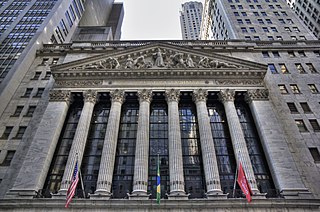
A stock exchange, securities exchange, or bourse is an exchange where stockbrokers and traders can buy and sell securities, such as shares of stock, bonds and other financial instruments. Stock exchanges may also provide facilities for the issue and redemption of such securities and instruments and capital events including the payment of income and dividends. Securities traded on a stock exchange include stock issued by listed companies, unit trusts, derivatives, pooled investment products and bonds. Stock exchanges often function as "continuous auction" markets with buyers and sellers consummating transactions via open outcry at a central location such as the floor of the exchange or by using an electronic trading platform.
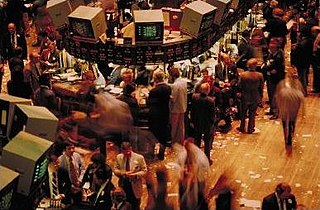
A capital market is a financial market in which long-term debt or equity-backed securities are bought and sold, in contrast to a money market where short-term debt is bought and sold. Capital markets channel the wealth of savers to those who can put it to long-term productive use, such as companies or governments making long-term investments. Financial regulators like Securities and Exchange Board of India (SEBI), Bank of England (BoE) and the U.S. Securities and Exchange Commission (SEC) oversee capital markets to protect investors against fraud, among other duties.

Financial services are economic services tied to finance provided by financial institutions. Financial services encompass a broad range of service sector activities, especially as concerns financial management and consumer finance.
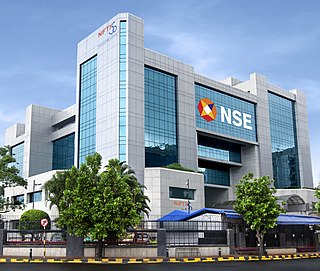
National Stock Exchange of India Limited (NSE) is one of the leading stock exchanges in India, based in Mumbai. NSE is under the ownership of various financial institutions such as banks and insurance companies. It is the world's largest derivatives exchange by number of contracts traded and the third largest in cash equities by number of trades for the calendar year 2022. It is the 7th largest stock exchange in the world by total market capitalization, as of January 2024. NSE's flagship index, the NIFTY 50, a 50 stock index is used extensively by investors in India and around the world as a barometer of the Indian capital market. The NIFTY 50 index was launched in 1996 by NSE.
An exchange-traded fund (ETF) is a type of investment fund that is also an exchange-traded product, i.e., it is traded on stock exchanges. ETFs own financial assets such as stocks, bonds, currencies, debts, futures contracts, and/or commodities such as gold bars. The list of assets that each ETF owns, as well as their weightings, is posted on the website of the issuer daily, or quarterly in the case of active non-transparent ETFs. Many ETFs provide some level of diversification compared to owning an individual stock.
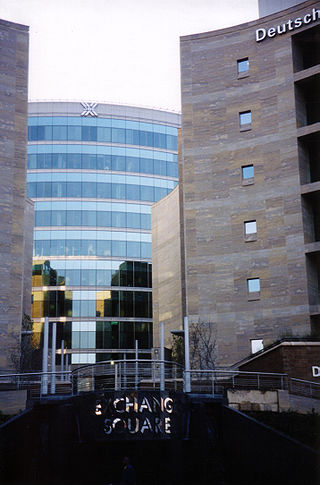
JSE Limited is the largest stock exchange in Africa. It is located in Sandton, Johannesburg, South Africa, after it moved from downtown Johannesburg in 2000. In 2003 the JSE had an estimated 473 listed companies and a market capitalisation of US$182.6 billion, as well as an average monthly traded value of US$6.399 billion. As of March 2022, the market capitalisation of the JSE was at US$1.36 trillion.

The Colombo Stock Exchange (CSE) is the main stock exchange in Sri Lanka that utilizes an electronic trading platform. The CSE headquarters have been located at the World Trade Center (Colombo) Towers in Colombo since 1995, and it has regional branches in Kandy, Jaffna, Negombo, Matara, Kurunegala, Anuradhapura and Ratnapura. The CSE trades 296 companies representing 20 business sectors, as of 25 January 2021, with a combined market capitalization of 3,699 billion Sri Lankan rupees.
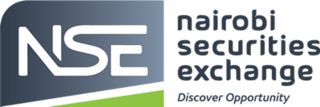
The Nairobi Securities Exchange (NSE) was established in 1954 as the Nairobi Stock Exchange, based in Nairobi the capital of Kenya. It was a voluntary association of stockbrokers in the European community registered under the Societies Act in British Kenya. The exchange had 66 listed companies in February 2021.
Go Out policy or the Going Global Strategy, is the People's Republic of China's current strategy to encourage its enterprises to invest overseas. The policy was announced as a national strategy by Jiang Zemin in March 2000.

The Ghana Stock Exchange (GSE) is the principal stock exchange of Ghana. The exchange was incorporated in July 1989 with trading commencing in 1990. It currently lists 42 equities and 2 corporate bonds. All types of securities can be listed. Criteria for listing include capital adequacy, profitability, spread of shares, years of existence and management efficiency. The GSE is located within the Cedi House in Accra.

The Nigerian Stock Exchange (NSE), now Nigerian Exchange Group, is a Nigerian stock exchange founded in 1961 in Lagos. As of November 2019, it has a total of 161 listed companies, with 8 domestic companies on the premium board, 144 companies on the mainboard, and 4 on the Alternative Securities Market (ASeM) board. In the Fixed Income market, the NSE has 84 FGN bonds, 21 state bonds, 27 corporate bonds, 1 supranational bond, and 53 memorandum listings.

The Tehran Stock Exchange (TSE) is Iran's largest stock exchange, which first opened in 1967. The TSE is based in Tehran. As of May 2023, 666 companies with a combined market capitalization of US$1.45 trillion were listed on TSE. TSE, which is a founding member of the Federation of Euro-Asian Stock Exchanges, has been one of the world's best performing stock exchanges in the years 2002 through 2013. TSE is an emerging or "frontier" market.
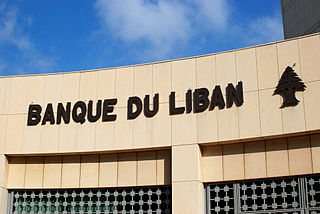
Banque du Liban is the central bank of Lebanon. It was established on August 1, 1963, and became fully operational on April 1, 1964. In 2023, Wassim Mansouri stepped up as interim governor of the Banque du Liban after Lebanon failed to name a successor to Riad Salameh, whose term finished in July 2023.

The Colombia Securities Exchange is a stock exchange which was created as a result of merging three independent stock exchanges: Bogotá, Medellín and Occidente. It has offices in Bogotá, Medellín and Cali. Furthermore, with the bvc Training Centers the company is located in 19 Colombian cities through agreements with universities and chambers of commerce.
EFG Hermes Holding S.A.E. is an Egyptian financial services company present in the Middle East, North Africa, Sub-Saharan Africa, and South Asia regions and specializes in securities brokerage, asset management, investment banking, private equity and research in addition to finance lease, factoring, microfinance, Financial technology, mortgage, and insurance. EFG Hermes serves a range of clients including sovereign wealth funds, endowments, corporations, financial institutions, high-net-worth clients and individual customers. EFG Hermes is listed on the Egyptian Exchange (EGX) and London (LSE) stock exchanges. EFG Hermes has offices in Egypt, the United Arab Emirates (UAE), the Kingdom of Saudi Arabia (KSA), Pakistan, Oman, Kuwait, Jordan, Kenya, Nigeria, UK, United States and Bangladesh with over 4,500 people from 25 nationalities. They serve clients from the Middle East, North Africa, Europe and the United States. Currently, EFG Holding is listed as number 13 in Forbes' Top 50 Listed Companies in Egypt 2023.

The Lusaka Stock Exchange is the principal stock exchange of Zambia. Founded in 1993, it is located in Lusaka. The LuSE is a member of the African Stock Exchanges Association.
A Stock exchange is a corporation or mutual organization which provides facilities for stockbrokers and traders to trade stocks and other securities. It may be a physical trading room where the traders gather, or a formalised communications network. Creation of a stock exchange is a strategy of economic development: it provides a means of raising capital for investment. Stock markets may enhance economic activity through the creation of liquidity: a liquid equity market makes investment more attractive because it allows individuals to acquire equity and when required to sell it quickly and cheaply. At the same time, companies enjoy permanent access to capital raised through equity issues. It has been found that countries that open stock markets grow faster, on average, than the control groups.

The Somali Stock Exchange (SSE), also known as the Somalia Stock Exchange, is the national bourse of Somalia founded by SEF.
HDFC Securities Limited is a financial services intermediary and a subsidiary of HDFC Bank, a private sector bank in India. HDFC Securities was founded in year 2000 and is headquartered in Mumbai, with branches across major cities and towns in India.














